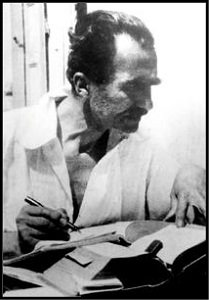Bij de eerste zondag van de vasten

De verzoeking van Christus door Ary Scheffer, 1854
De verzoeking in de woestijn
Matth. IV. v. 1-11.
I.
De booze.
Hoe? Is des Boozen euvelmoed
Zoo groot, dat niets hem vreezen doet,
Dat hij den Reinen aan durft blikken
En tarten tot zijn worstelperk?
Durft hij, door list en lagen sterk,
Den Heilgen lokken in zijn strikken?
Vernam hij, in de afzichtbre hel,
Van Gods genade ’t grootsch bestel,
Zoo is de tijd zijns wroks gekomen;
Want de aarde, ’t voorwerp van zijn wensch,
Met den door hem gevallen mensch,
Zijn roof, zijn buit wordt hem ontnomen.
Verborgen voor zijns volks gezicht,
Bereidt zich Jezus tot den plicht,
Waarop hij ’t oog des geestes vestte,
En toeft in ’t hart der woestenij.
Reeds veertig dagen vastte hij,
Maar nu, nu hongert hem ten leste.
Daar treedt, geoefend op verraad,
Met vriendlijk oog en heusch gelaat,
De Satan voor des Heilands oogen:
‘Hoe? Lijdt Gods zoon hier hongersnood?
Hij vordre van dees rotsen brood;
Wat zou Zijn almacht niet vermogen?’
Naar ’s Tempels tinnen voert hij hem.
‘Welnu,’ klinkt des Verzoekers stem,
‘Werp, werp u af! Gij moogt het wagen.
Zijt Gij Gods Zoon, voor u geen nood!
Daar de Englen Gods Gods Gunstgenoot,
Op hunne handen zullen dragen.’
Hij voert hem op een hoogen berg,
Dat hij zijn hart met eerzucht terg:
‘Ziehier al ’s werelds vorstendommen!
Indien gij neervalt aan mijn kniên,
Zult gij ze in Uwe handen zien,
Ten top van grootheid opgeklommen.’
De Heilige blijft onverlokt;
Geen list des Satans, die hem schokt
Of in zijn hart den lust kan wekken;
Hij keert de pijlen, die hij spilt,
Op ’t godlijk woord als op een schild,
En dwingt hem schaamrood af te trekken.

Nicolaas Beets (13 september 1814 – 13 maart 1903)
Sint Bavo kathedraal in Haarlem, de geboortestad van Nicolaas Beets
Zie voor de schrijvers van de 18e februari ook mijn vorige twee blogs van vandaag.



